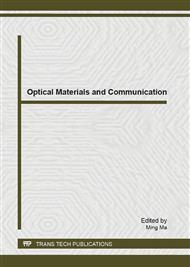p.89
p.95
p.101
p.107
p.115
p.121
p.127
p.131
p.137
A WSN-Based Localization Scheme Considering the Reliability of RSSI Measurements
Abstract:
In this paper, we propose a localization scheme considering the reliability of RSSI (Received Signal Strength Indication) measurements in the WSN (Wireless Sensor Network) environment. This scheme attempts to reduce location errors due to indoor obstacles or environmental factors, when location calculations are based on RSSI. The standard deviation is used to evaluate the reliability of RSSI measurements from the reference node. Also, the directional path loss exponent is calculated through learning with respect to the reference node. The experimental results show that the proposed localization scheme improves the performance significantly in terms of location accuracy, compared to the existing RSSI-based approaches.
Info:
Periodical:
Pages:
115-120
DOI:
Citation:
Online since:
April 2013
Authors:
Keywords:
Price:
Сopyright:
© 2013 Trans Tech Publications Ltd. All Rights Reserved
Share:
Citation:


